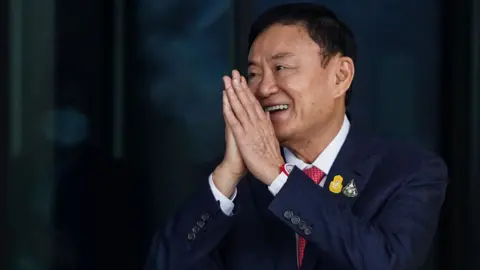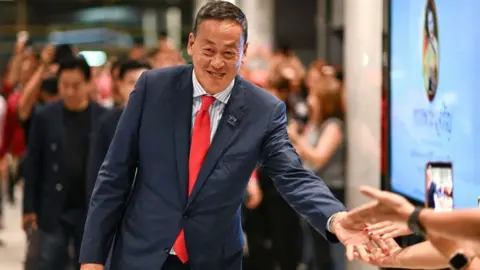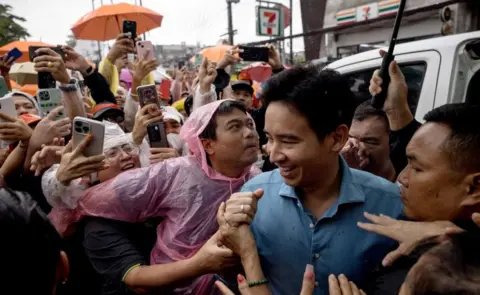Thaksin's return seals grand Thai political bargain
 Getty Images
Getty ImagesWhen fugitive former prime minister Thaksin Shinawatra made his dramatic return to Thailand there was one question everyone was asking: how long would he actually spend in jail?
Now we know the answer: just over 12 hours.
To no-one's surprise Thailand's department of corrections said this morning that, in order to monitor a heart condition, Mr Thaksin was whisked to a civilian hospital at midnight.
He is expected to stay there, in his own private wing or floor, while he prepares to petition King Vajiralongkorn for a pardon to set aside the eight-year prison sentence on three charges imposed in his absence. This was confirmed by the Supreme Court in Bangkok shortly after his arrival.
The end of Mr Thaksin's 15-year-long exile is not an isolated event. It is a part of a grand political bargain. It is being put in place, like the pieces of a jigsaw, to end the epic contest for power between the telecoms tycoon and his populist Pheu Thai party, and Thai conservative groups aligned with the military and monarchy.
Both sides now face a new threat in the form of the progressive and youthful Move Forward party, which has brought them together.
It is no coincidence that Mr Thaksin returned on the same day Pheu Thai's candidate was voted the country's next PM. Property developer Srettha Thavisin, was approved by a substantial majority, enabled by a coalition, which includes parties that were once Mr Thaksin's bitterest foes.
That Mr Thaksin arrived several hours before the vote suggests he was confident of the outcome. And that he knew this deal between once irreconcilable adversaries was solid, that by the end of the day he would enjoy the protection of having his own party in office.
So Thailand finally has a government, more than three months after the election. But Thai people can be forgiven for thinking this is not what they voted for. It does not include the party that won the most seats - Move Forward - which was blocked by the military-appointed senate from forming a government.
But it does include most of the parties from the outgoing, military-backed administration - even those led by two of the coup-makers responsible for ousting the last Pheu Thai government in 2014, and for the military operation against pro-Thaksin protesters in 2010 which killed dozens of people.
For Pheu Thai's grass-roots "red shirt" supporters this will be a bitter pill to swallow, and many say they will stop backing the party.
 Getty Images
Getty ImagesThe new government is also likely to allocate strategically important ministries like defence and interior to the conservative parties as part of the grand bargain. Pheu Thai's past promises of reform, like amending the military-drafted constitution, may fall by the wayside when it encounters opposition from its coalition partners.
Given the high hopes of a fresh new start for Thailand when Move Forward stunned everyone, including its own young candidates, with its election victory in May, this is a dismal outcome for many Thai voters.
"So the people voted for the number one party, just for it to be in opposition? Then why even have an election?", wrote one exasperated person on Twitter.
"It's like winning the world cup on penalties", wrote another. "This is nothing to be proud of".
"I have never regretted voting for Move Forward", said another. "At least it showed some people's true colours. The next election will be a landslide for Move Forward!"
There has been angry talk of a stab-in-the-back by Pheu Thai, which initially pledged to join a Move Forward-led coalition, and of Pheu Thai selling out.
But Mr Thaksin's election-winning machine was never a radical or progressive party, in the way that Move Forward aspires to be.
It was a populist party with brilliantly-marketed policies, which initially lifted the living standards of previously neglected parts of the Thai population, and which, for 20 years, gave it an unassailable edge over its rivals.
But it was always pragmatic, not ideological. And it has always been swayed primarily by the interests of the Shinawatra family, who have remained its main source of funding and its most important decision-makers.
This year's election was the first since the 1990s that a Shinawatra party did not win the largest share of seats in parliament. It was a wake-up call.
 Getty Images
Getty ImagesOther parties have borrowed Pheu Thai's signature populist policies, and Move Forward, with its far-reaching agenda for change, gained millions of voters, mainly at Pheu Thai's expense. Mr Thaksin and the conservatives both saw a threat from the same quarter, and decided to bury the hatchet to confront it.
The new government is likely to focus its early efforts on the Thai economy, with the hope that making people feel better off will help them forget the unseemly way this coalition was brought about.
But holding this disparate alliance of parties together will be a challenge, especially for the new PM, Mr Srettha. He has little political experience, is not popular with some even in his own party, and will be hostage to the wishes of the Shinawatra family, just as Mr Thaksin is hostage to his own need to stay out of jail.
Hoping to get out policies with enough wow factor to win over Thailand's disillusioned voters may be unrealistic.
And Mr Srettha will face an opposition in Move Forward that is motivated to show the Thai people what a poor outcome they have got from their election.
In the last parliament Move Forward already showed itself to be skilled at skewering the hypocrisy and false promises which are a hallmark of Thai politics. They will do it again.
Earlier this month the deputy speaker, a Move Forward MP, used the entertainment budget that comes with his post to lay on a barbecue meal for 370 cleaning staff at the parliament, the first time, they say, that their work has been recognised in this way.
This compassionate but clever move has now started a public debate about how Thai MPs use their expenses, showing the idealistic and frugal Move Forward MPs to their advantage.
In the past it is something that Pheu Thai, with its cherished label as a champion of the downtrodden, might have been expected to think of.
That it came instead from Move Forward is perhaps a sign of the shifting political sands in Thailand.
Additional reporting by Thanyarat Doksone
